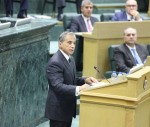You are here
Candidates ‘pose serious dangers to the people and the peace of this region’
Mar 09,2016 - Last updated at Mar 09,2016
Donald Trump and rival Republican candidates pose serious dangers to the people and the peace of this region.
First and foremost, billionaire businessman Trump, and senators Marco Rubio and Ted Cruz are both ignorant, and ignorantly aggressive when quizzed in debates about how they would deal with Muslims and Arabs, and regional crises.
At domestic level, anti-Muslim statements by these and other candidates reflect common sentiments and have led to the trebling of hate crimes against Muslims since late last year.
Islamophobic bullying of Muslim students in schools has become widespread.
Named “Islamophobe of the year” by a British human rights group, Trump has, infamously, called for Muslims fleeing wars waged by the US directly (Afghanistan and Iraq) or indirectly (Syria and Yemen) to be barred from entering the US, at a time 1.25 million reached Europe.
The award was announced following the shooting by a Muslim couple that killed 14 people in San Bernardino, California, on December 2, 2015. In response, Trump demanded a “total and complete shutdown of US borders to Muslims” until the US is able to understand and deal with such crimes.
He also called for the mass registration by the government of Muslims and the closure of US mosques.
His statements prompted half a million Britons to sign a petition condemning “hate speech” and calling on the authorities to bar him from entering the UK.
Trump horrified many when he said he would order the US military to murder the innocent wives and children of “terrorists”, although this would be illegal in US and international law.
On torture, he favours using water-boarding and tougher measures against suspected “terrorists”, i.e., Muslims.
Rubio does not favour demonising Muslims, but calls for “recognising the threat of racial [fundamentalism] without having to demonise an entire region”.
He opposes a ban on Muslims from entering the US, as it is unconstitutional, but favours closing down “any place — be it a café, a diner, an Internet site — any place where [Muslim] radicals are being inspired”.
This could lead to spying and abuse of power.
While Cruz is also against a bar on Muslims entering the US, he and Rubio would be prepared to adopt illegal methods of torture.
These men are particularly dangerous on the US domestic scene because they appeal to and confer respectability on the sectarian prejudices of voters.
A poll found 80 per cent of Trump’s South Carolina supporters and 67 of those backing Cruz favour keeping Muslims out of the US. Sixty per cent of Republicans across the board agree.
On the Syrian war that threatens the entire region, the three diverge.
Trump said he opposed the ouster of Syrian President Bashar Assad, since the opposition consists of unknown figures that the US might not find acceptable.
He is too ignorant of the politics of the region to realise that the dysfunctional opposition and hundreds of armed groups could fracture Syria into warring warlord fiefdoms — the most likely outcome if there is no a carefully planned and well executed transition from Assad to a credible, majority Syrian-supported democratic successor.
On the issue of Assad, Cruz takes the same line as Trump. Cruz argues that the US should not try to effect regime change in Syria, as this could allow Daesh and Al Qaeda to come to power in that country. The priority has to be crushing Daesh.
“For as bad as Assad was and is, radical jihadis patrolling Syria would be a significant turn for the worse,” he says.
Cruz seeks to destroy Daesh with “overwhelming air power” and providing arms for the Kurds.
This is unrealistic because ground forces are essential in fighting guerrilla armies like that of Daesh.
Syrian Kurds do not have large enough forces to take on Daesh without reinforcements. Furthermore, the Kurds are committed mainly to defending and holding onto the areas where they are a majority.
They and the Iraqi Kurds do not want to overstretch their forces by taking on Daesh in Sunni Arab areas like Raqqa and Mosul.
Cruz’s approach would not defeat Daesh.
Cruz said he would rebuild the US military and go after “every Muslim militant on the face of the earth… if they go and join [Daesh]. If they wage jihad against the United States of America, they are signing their own death warrant”.
More knowledgeable about the region because he has served on the Senate Foreign Affairs Committee, Rubio has even put forward a plan to counter extremists.
He would seek to build a “multinational coalition of countries willing to send troops into Iraq and Syria, and aid local forces on the ground”.
He would also try for regime change, declare no-fly zones and coalition-controlled “safe zones” that would provide sanctuary for refugees, and a place to arm and train insurgents.
Rubio says: “I would oppose Russia and Iran in their fight to prolong Assad’s... regime.”
His approach is both ignorant and unrealistic.
Since 2011, Turkey has been doing just this. Ankara has set up “safe zones” on its own territory just across the border from Syria, where refugee camps have been established, anti-Assad fighters recruited, trained, armed and sent back across the frontier.
There they have been sustained by weapons and funds and bolstered by foreign fighters entering Syria through Turkey. Since the “safe zones” have been inside Turkey, they have not been attacked by the Syrian air force or troops, or, since last October, by Russian warplanes.
Russia would not hesitate to strike such zones if established within Syria, particularly if Al Qaeda’s Jabhat Al Nusra took refuge in these areas.
Rubio wants US ground troops to tackle Daesh wherever the cult is present — from Iraq and Syria to Sinai and Libya. He calls for a Sunni alliance against Daesh.
This is unrealistic because this alliance would shun the most effective anti-Daesh forces, Shiite militias in Iraq and to a lesser extent in Syria, due to their ties to Iran.
President Barack Obama has, unfortunately, allowed anti-Muslim rhetoric to soar uncontested until recently. He paid his first visit to a mosque only last month. During that event, Obama, whose father Hussein Obama was Muslim, sought to refute “inexcusable [Republican] political rhetoric against Muslim-Americans… We can’t be bystanders to bigotry. Together, we’ve got to show that America protects all faiths”.
An opinion survey released about the same time as his mosque visit showed that 68 per cent of US citizens agree with Obama that “there is an organised extremist element” among Muslims that twists the texts of the faith to “justify their killing and their terror”.
But a reasonable view on this issue does not indicate how they feel towards Muslim citizens and visitors.
Republicans expressing their views in other opinion polls showed that they agree with Trump that militancy should be countered by surveillance of Muslims in the US and exclusion of all Muslims applying to enter.












